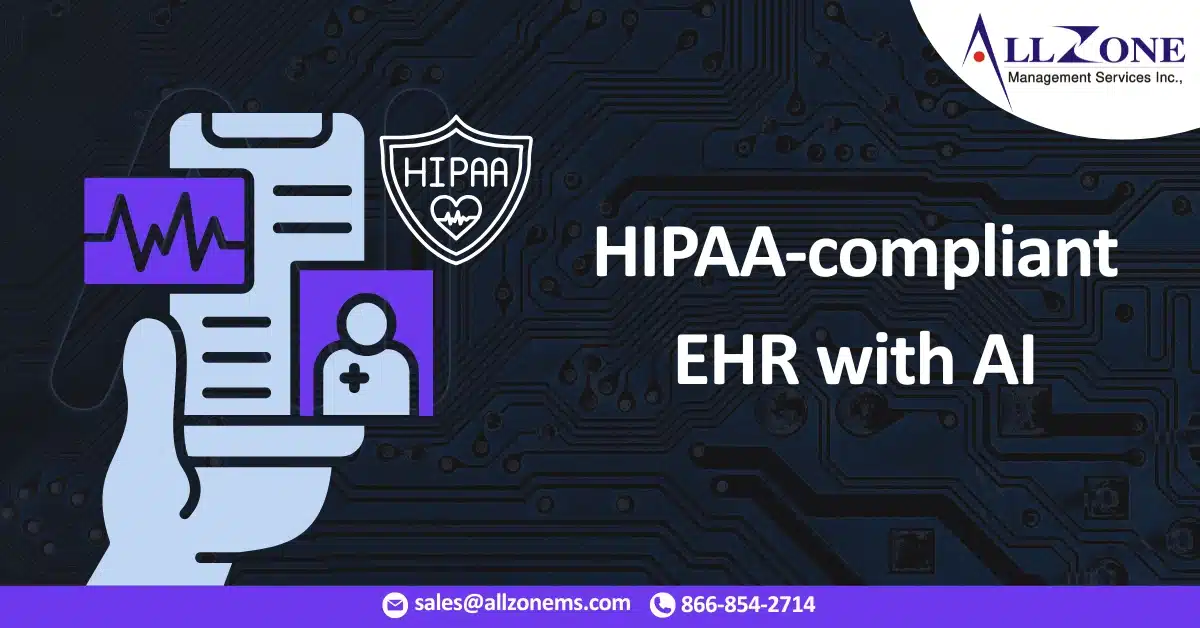A HIPAA-compliant EHR with AI and automation not only ensures regulatory compliance but also leverages advanced technologies to enhance security, improve efficiency, and streamline healthcare workflows
In an era where data breaches and cyber threats are at an all-time high, the need for a secure electronic health record (EHR) system has never been more critical. As healthcare providers increasingly transition to digital record-keeping, the integration of artificial intelligence (AI) and automation is reshaping how patient data is managed and protected. A HIPAA-compliant EHR with AI and automation not only ensures regulatory compliance but also leverages advanced technologies to enhance security, improve efficiency, and streamline healthcare workflows.
The Importance of HIPAA Compliance in EHR Systems:
The Health Insurance Portability and Accountability Act (HIPAA) sets the standard for protecting sensitive patient information. Any EHR system must comply with HIPAA regulations to ensure that electronic health records remain secure from unauthorized access, breaches, and cyberattacks.
A HIPAA-compliant EHR includes essential security features such as encryption, access controls, and audit trails to monitor data activity. However, traditional EHR systems often face challenges related to human error, inefficiencies, and security vulnerabilities. This is where a HIPAA-compliant EHR with AI and automation plays a transformative role in strengthening compliance and security.
How AI Enhances the Security of HIPAA-Compliant EHR:
AI is revolutionizing the healthcare industry by offering predictive analytics, automated monitoring, and intelligent threat detection. When integrated into a HIPAA-compliant EHR, AI enhances security in several key ways:
Automated Threat Detection: AI-powered algorithms can detect unusual patterns in data access, flagging potential security breaches before they occur.
Predictive Risk Analysis: AI can analyze past cyber threats and predict potential vulnerabilities, allowing healthcare organizations to proactively strengthen their security measures.
Smart Authentication: Advanced biometric authentication and AI-driven access controls help ensure that only authorized personnel can access sensitive patient data.
Real-Time Compliance Monitoring: AI continuously monitors compliance with HIPAA regulations, ensuring that any potential violations are identified and corrected immediately.
The Role of Automation in Improving EHR Efficiency:
Automation is another crucial factor in enhancing the efficiency and security of a HIPAA-compliant EHR. By minimizing manual data entry and automating routine processes, healthcare providers can reduce human errors and improve workflow efficiency.
Some key benefits of automation in EHR systems include:
- Automated Data Entry & Documentation: Reduces errors caused by manual input and ensures that patient records are accurate and up-to-date.
- Streamlined Patient Communication: AI-driven chatbots and automated appointment scheduling improve patient engagement and reduce administrative burdens.
- Enhanced Data Backup & Recovery: Automated backup systems ensure that patient data is securely stored and can be quickly recovered in case of an emergency or cyberattack.
- Future Trends: The Next Phase of HIPAA-Compliant EHR
As technology continues to advance, the future of HIPAA-compliant EHR systems will likely see greater adoption of AI-driven cybersecurity measures, blockchain for secure data sharing, and machine learning to optimize patient care.
Additionally, the rise of telemedicine and remote patient monitoring will necessitate even stricter compliance measures to protect patient data across digital platforms. Healthcare organizations must stay ahead by adopting AI and automation to maintain security and compliance while delivering high-quality care.
Conclusion:
The integration of a HIPAA-compliant EHR with AI and automation is not just a trend—it is a necessity in the modern healthcare landscape. These technologies enhance security, improve operational efficiency, and ensure compliance with HIPAA regulations. As cyber threats continue to evolve, investing in advanced EHR solutions will be crucial for healthcare organizations to safeguard patient data and maintain trust in the digital age.
By embracing AI-driven security and automation, healthcare providers can create a more resilient, efficient, and secure healthcare ecosystem. Now more than ever, a HIPAA-compliant EHR is the key to ensuring patient data remains protected in an increasingly digital world.
The Importance of HIPAA-Compliant EHR with AI and Automation for Medical Billing Companies
Medical billing companies face increasing demands for accuracy, efficiency, and data security. Integrating a HIPAA-compliant Electronic Health Record (EHR) system equipped with AI and automation is essential for streamlining operations while safeguarding patient data.
A HIPAA-compliant EHR ensures that patient information is handled in accordance with strict federal regulations, minimizing the risk of data breaches and compliance violations. This is crucial for medical billing companies, as any breach can lead to legal consequences, loss of client trust, and hefty fines.
AI and automation further enhance the EHR system by automating routine tasks, reducing human error, and improving coding accuracy. These features facilitate seamless data extraction, automated claim submission, and faster reimbursement processes. AI-powered analytics also offer valuable insights into claim trends, denials, and revenue cycle performance.
Moreover, automation speeds up the coding process, allowing medical billing companies to handle higher volumes with precision and efficiency. Automated alerts for incomplete or incorrect data significantly reduce claim denials and rework, ultimately boosting profitability.
Incorporating a HIPAA-compliant EHR with AI and automation is not just an upgrade; it’s a strategic move that optimizes revenue cycle management, enhances data security, and ensures compliance, making it indispensable for medical billing companies.
Disclaimer:
This content is for informational purposes only and should not be construed as medical advice. Please consult your healthcare provider before making any changes to your wellness routine.

